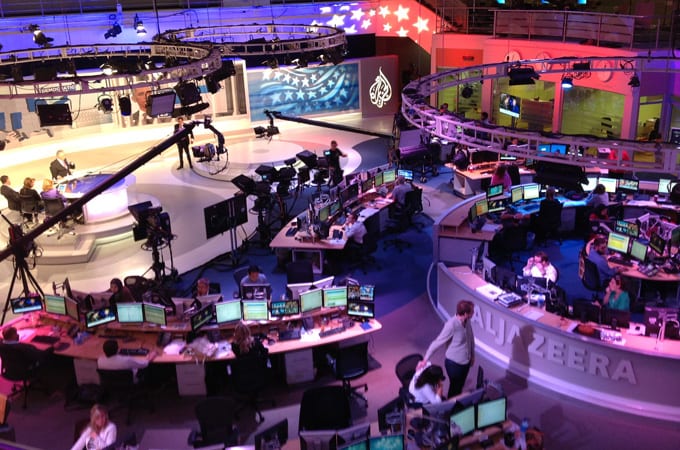Al-Jazeera’s big gamble
By Patrice Greanville
“
So reads one of the headlines announcing that Al-Jazeera (AJ) has acquired Current TV (for a rumored $500 million), the floundering cable network founded by Al Gore. The news has been received with outright indignation in some quarters, and cautious celebration in others. (Gore and his partners, according to Bloomberg, are said to have walked away with an estimated $440 million in profit). The fear among conservatives (which includes much of the liberaloid establishment) is that Al-Jazeera, already well known for its consistently incisive coverage of international affairs, may actually inject some truth into the thoroughly indoctrinated and fossilised American mind, and by so doing rock the long and firmly moored boat.
The American political propaganda system (“the well baptized “Brainwash under freedom”) is easily the best in the world, the smoothest and most effective in history, and much of the reason for its success resides in the fact that the dissemination of its highly adulterated version of reality is done seamlessly by hundreds of millions of conscious and unconscious actors on a daily basis, from the mighty engines of mass communications to the average citizen who “freely” regurgitates —at the retail level—the chief memes approved by the mainstream culture. But there’s an Achilles heel: this mutually-reinforcing edifice of lies requires robust consistency for its survival, no real competition of any sort. The grotesque self-serving lies, omissions and distortions must not be repeatedly challenged by any visible carrier of alternative visions. Al-Jazeera, more than Current TV, which quickly degenerated into an ideological instrument for the Democratic party, the television equivalent of Daily Kos (as is MSNBC), represents a potentially dangerous crack on the wall of conformity enveloping American opinion. Stubborn resistance should be expected. As media observer Gary Wasserman has said in what sounds to me like a backhanded compliment, “With its alleged positions against U.S. foreign policies and wars, Al-Jazeera is just too ‘left’ to be allowed access to our fearful public.” In a ludicrous display of fealty to the cause, the suits at TIME-Warner, one of the giant cable distributors (and like the rest, a monopolist), already sanctimoniously kicked Current TV from its roster. Other distributors are likely to follow suit. This denies Al-Jazeera America a big chunk of the 40 to 60 million subscribers in Current TV’s ledger, posing difficult issues at the very time when this new medium will have to define itself.
Indeed, what awaits Al-Jazeera in America probably will not be pretty. Leaving aside the powerful Israeli lobby and its numerous assets and sympathizers throughout the American and Western media, people who can be relied on to spread all manner of venom about the Qatar-owned network, hinting darkly that Al-Jazeera is simply a Trojan horse to spread “anti-American” propaganda, there’s no scarcity of homegrown xenophobes likely to be shocked by Al-Jazeera’s intrusion into a jealously guarded sandbox, not to mention its way of doing journalism.
But if Al-Jazeera is not stifled in its crib, a reasonable concern, its entry into the crowded but pathetically narrow American marketplace of ideas could be a net win for US audiences. Al-Jazeera’s journalistic culture is simply superior to the American product, if for no other reason that, not being beholden to the imperial propaganda storylines that infect so much of US television, more often than not it stands to speak truth by default. While there’s no such thing as real objectivity (a grand conceit of US-style journalism), a measure of minimum professionalism, and a preoccupation with events and realities outside the perimeter of American narcissism will prove healthy and refreshing.
Huge stakes for all concerned
The industry scuttlebutt is that AJ is quite aware it faces an uphill battle in terms of ratings and a race to neutralize the flack from competitors (see Appendix below) and multiple political enemies, although when it comes to Gulf politics you do find strange bedfellows and the cues from the top of the American power pyramid could point to accommodation. In fact I would not be too surprised if this deal was made with the tacit support of powerful factions within the US ruling elite, groups that endorse a very flexible and cynical posture toward the Sheiks, Emirs, and so on. AJ is owned by Qatar and based in Doha, the site of many international meetings of the Masters of the Universe. (The new US franchise may operate from American soil.) Pre-empting a distribution sabotage, if AJ picks up traction it may even attempt to buy a major cable distributor, like Comcast. After all, what’s a few billions here and there for the well-heeled petromonarchies? Cable distributors are not subject to broadcasting license review, only territory assignments, but there money talks, too. A key player in this struggle will be the attitude of the print media, some of which may shut the door in AJ’s face (most are members of infotainment conglomerates with television and print in their bosoms), forcing it to engage in lawsuits to gain access, a conflict that could quickly evolve into a Supreme Court case, or simply take the Arab money and run.
The Arab nation, still schizophrenic in its relations with the West, has long wanted to have a media foothold in America, its chief ally and tormentor. Some of the Gulf potentates want to counter some of the overwhelming pro-Israeli wove in the reporting fabric of US media corporations.; they also see that buying Congress is easy but risky, much better to have indirect pressure mechanisms to turn public opinion on certain matters when needed. In the latter-day American Rome, as in the old Rome, the core of power is global, lacking in true nationalist loyalties and instincts. From an imperial viewpoint this is only logical, nationalistic boundaries are superfluous, even if the God of nationalism must be constantly appeased to keep the subject populations in check. Meanwhile everyone is buying pieces of the rotten core thereby literally dissolving its remaining national identity.
Possible incarnations
As things stand, the doomsayers may be proven wrong. Perhaps of maximum importance in this equation is that —in large measure because of the Internet—AJ already has a small but loyal audience base among Americans and Europeans. They are also seen in Japan and most of Latin America, where their programming is in general “anti-American” in hue, often backing Iran, for example, against US intimidation. AJ is indeed building an audience in America steadily, as is RT (Russian TV), which is also seeking and securing some penetration. All of this is possible because of the scandalous rottenness and cynicism of the American media, and much of the rest of the Western media. At least with AJ and RT you’re liable to get from 70 to 90% of the truth in most cases, unheard of by US standards. It reminds me of the Japanese car invasion in the late 60s which knocked some very belated sense into US carmakers. More sobering to the US networks, the Japanese and later other competitors of various flags, never withdrew.
The Al-Jazeera saga will make for interesting watching. Optimistically, the American propaganda monster might at last be challenged in its own lair. But how much of a challenge will be possible? Some speak—at last—of a network to offset Murdoch’s empire of filthy lies. If so, in terms of political niche AJ would have to position itself to the left of MSNBC to carve up a strong identity quickly. If it chooses the liberaloid slot occupied by MSNBC—just flogging the GOP and giving a pass to Obama and the Dems—it will lose all promise of improving the picture and also detonate a certain fight with NBC from the start.
ABOUT THE AUTHOR
 Patrice Greanville is a media critic, publisher of the first US radical media review, Cyrano’s Journal, and editor of The Greanville Post.
Patrice Greanville is a media critic, publisher of the first US radical media review, Cyrano’s Journal, and editor of The Greanville Post.
APPENDIX
Competitors
Since the launch of Al Jazeera English, Al Jazeera directly competes with BBC World and CNN International, as do a growing number of other international broadcasters such as France 24, NHK World, and Russia Today.
Another competitor is Al-Alam, Established in 2003 by Islamic Republic of Iran Broadcasting, it broadcasts continuously. It seeks to address the most challenging issues of the Muslim and Arab world and the Middle East.
When Euronews started broadcasting its programs in Arabic on 12 July 2008, it entered into competition with Al Jazeera. Arabic is the eighth language in which Euronews is broadcast, after English, French, German, Russian, Spanish, Italian, and Portuguese.